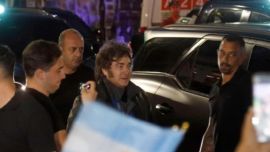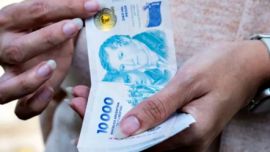This column dedicated to linking past and present normally picks up a news item from the current week but many of the headlines in the last few days have recently been discussed (thus beef export restrictions and the Paris Club were the subjects of May’s last two columns) while the chosen highlight of this 200th issue is Venezuela, perhaps uniquely combining interviews with both men calling themselves that troubled country’s president. So today we will go with the flow and run through newsroom memories of Venezuela, along similar lines to the perusal of Peru a fortnight ago.
My first memory of Venezuela long predates that Buenos Aires Herald newsroom experience. The very first issue of The Economist I read was in 1961 and I remember reading there that, contrary to general belief, the three strongest currencies in the then world were the Swiss franc, the Portuguese escudo (with the rigid monetarism of dictator Antonio Salazar) and the Venezuelan bolívar (backed by fabulous oil wealth). Six decades ago now and how times have changed, looking at the inflation of several thousand percent hitting Venezuela today.
Let us now fast forward to 1989 for my first real newsroom memory of Venezuela following the bland 1984-1989 presidency of Jaime Lusinchi (almost a Caribbean clone of his Argentine contemporary Raúl Alfonsín) – the Caracazo protests with an official death toll of 276 but probably at least 10 times that figure. Early that year Carlos Andrés Pérez returned to the presidency after a 1974-1979 term which had been one long boom thanks to the 1973 oil crisis disrupting so many other countries. But those blessings had turned into a curse the next time round – the so-called “Dutch disease” could just as well be dubbed Venezuelan from the way runaway public spending, an inflationary spiral, fading investor confidence and rampant corruption had eroded the economy, forcing the social democrat Carlos Andrés into the tough medicine also deployed by his namesake and contemporary Carlos Menem in Argentina, as elsewhere in a Washington consensus world.
Deregulation and austerity in general but doubled petrol prices and a 30 percent public transport hike amid a wage freeze in particular (factors which our current president and vice-president would be old enough to recall vividly, perhaps accounting for many of their current policies) caused Caracas to erupt into a mayhem of violence and looting. With “erupt” an extremely apt verb for anybody at all familiar with Caracas geography – the downtown capital is situated in a valley surrounded by skyscraper slums perched on the steep slopes of the encircling hills so that the impression is very much living under a social volcano. Throw into that Venezuela being traditionally one of the most violent societies in the world with a pre-pandemic death toll of over 23,000 in 2019 (itself sharply down from previous years despite an apparent escalation of extrajudicial executions by Bolivarian hit squads, thus making Venezuela’s appalling political violence also relative). Pérez rode out this storm but failed to complete his term, falling a year short (my Perfil employers will perhaps not thank me for adding that Noticias magazine wrote a lucid article on him but accompanied by photographs of Israel’s Shimon Peres!)
In the four decades between the fall of the dictator Marcos Pérez Jiménez in 1958 and the advent of Hugo Chávez in 1998, Venezuelan democracy had every appearance of a stable democracy with a strong two-party system almost along German lines featuring steady alternation between social democrats (Acción Democrática) and Christian democrats (COPEI). But the recycling of former presidents in its final decade (first Pérez and then Rafaela Caldera) was a tell-tale sign of running dry. When Chávez achieved with the ballot what he failed to achieve with the bullet in 1992, his 1998 electoral triumph of 56 percent was a fair reflection of the disenchantment with traditional politics and the hopes aroused by the paratrooper but Venezuelan democracy did not die with the century – elections broadly echoed the popular will through to the parliamentary elections of 2015 (when an opposition landslide of two-thirds of the seats was allowed to stand) while even in the 2017 regional elections an opposition win was recognised for five of the 23 states even if their 20 percent lead in opinion polls undoubtedly entitled them to more. But the replacement of parliament with a constituent assembly in 2017 marked a final departure from democracy with every vote since then (including Nicolás Maduro’s 2018 re-election) a total farce.
Venezuelan politics in this century – 15 years of Chávez until his death from cancer in 2013 and Maduro since then – should be familiar enough to most informed readers, especially given the extremely close relationship with Kirchnerism. Plenty of other opinions here ranging from slavish adoration of the ruling ideology (thus Alicia Castro presents Venezuela’s unbelievably low coronavirus figures as proof that it has the best public health system in the Americas) to a rather more prevalent demonisation. Neither is recommended. Venezuela’s way to hell has been paved with good intentions. Normally the economics of populist pricing has a limited shelf life because production grinds to a halt when it cannot recover its costs (something apparently beyond the ken of our current government) but in Venezuela’s case the decade of generally three-digit world oil prices between 2004-2005 and 2014-2015 arrived just in time when reserves and the consensus behind Chávez were facing exhaustion so that a free ride for the masses could be continued and even extended beyond all reason and any chance of self-correction. However demented Maduro might appear addressing birds as his mentor, his transformation obeys a rational logic – his resemblance to Stalin became more than facial from the time 2014 world oil prices were halved to US$46 per barrel in 2015.
On only one point does my interpretation differ from what can be widely read elsewhere. The three-day loss of power of Chávez in 2002 is almost universally described as a coup. I was writing the ‘LatAm’ Watch column for the Herald at the time and followed events closely. As l saw it, an opposition demonstration outside Miraflores turned nasty with some 20 people killed and Chávez had a panic attack, temporarily paralysed into inaction and thus creating a power vacuum into which the opposition rashly moved. But when Chávez recovered his nerve, he found himself retaining enough military and popular support to regain power easily.
But enough of second-hand opinions – this newspaper carries interviews with both the men claiming the presidency, so why not see what they have to say at first hand?



















Comments